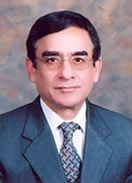Senator Dr Javaid Laghari’s address to the
Senate on Foreign Policy – August 22. 2007
Today, we have a debate on foreign
policy and Pakistan’s standing in the world. Pakistan has recently been
called the World’s most dangerous country by the US Senate Committee on
Foreign Relations.
We are once again in a crisis, and it's a crisis that threatens not only
Pakistan and the region, but possibly the entire world.
This crisis is because of the failed policies of General Musharraf in
combating terrorism and in not allowing this country to return to true
democracy.
No doubt the world is concerned and is watching the political developments
in Pakistan carefully.
This crisis has its roots almost half a century ago, when the military first
seized power in 1958.
Four military dictatorships -- and most recently those of General Zia ul-Haq
in the '80s and now General Musharraf -- have ruled Pakistan for the last 30
years, except for a few years of civilian government.
And so democracy has never really been given a chance to grow or nurture in
Pakistan.
The Military dictatorship, first in the '80s and now again, under General
Musharraf, has put into place a government that is unaccountable, that is
unrepresentative, that is undemocratic, and that is disconnected from the
ordinary people in the country, disconnected from the aspirations of the
people who make up Pakistan.
Moreover, military dictatorship is born from the power of the gun, and so it
undermines the concept of the rule of law, and gives birth to a culture of
might, a culture of weapons, violence and intolerance.
It is this culture that breeds terrorism that we and the world are so
concerned about. That is why we have been called the most dangerous country
in the world.
The major infrastructure building blocks of democracy have been weakened,
political parties have been marginalized, NGOs are dismantled, judges sacked
and civil society undermined.
But today in this debate on foreign policy of Pakistan, I would like to tell
the world that they are wrong in their notion that the choice in Pakistan is
between military dictatorship and religious parties.
The choice for Pakistan today is actually between dictatorship and
democracy.
And the real choice that the world also faces today is the choice between
dictatorship and democracy.
And in the choice that we make between dictatorship and democracy lies the
outcome of the battle between forces of extremism and forces of moderation
in Pakistan.
The military dictatorship has exiled the moderate leadership of the country;
it has weakened internal law enforcement and allowed for the suppression of
people's human rights.
The military operation in Baluchistan is an example of the brutality of the
suppression. The killings that took place in Karachi on May 12th, where 48
peaceful political activists were gunned down in the streets of Karachi, and
not one person has been arrested for those murders that were actually
televised, shows the level to which the regime permits the suppression of
the political opposition.
And the world is watching.
And by viewing the events of May 12, where no one is arrested to date, the
world rightly considers us as the most dangerous country in the world.
The Bush administration’s close association with a military dictatorship is
alienating Pakistan’s people and is playing into the hands of those
hardliners who blame the West for the ills of the region.
The West would do well by keeping away from supporting a military
dictatorship in Pakistan.
But it need not be this way.
A people inspired by democracy, human rights and economic opportunity will
turn their back decisively against extremism and terrorism.
They will take Pakistan back to the age of moderation and development, and
to join the ranks of peaceful and developed countries of this world.
However, there is a silver lining on the clouds.
The recent restoration of the Chief Justice of Pakistan to the Supreme Court
has given hope to people of Pakistan that the unchecked power of the
military will now finally come under a degree of scrutiny by the highest
judicial institutions in the country.
A democratic Pakistan would help stabilize Afghanistan, bring peace to the
region, and relieve pressure on our troops sent to suppress our own people
in the tribal belts.
A democratic Pakistan where the rule of law is established.
A democratic Pakistan that puts the welfare of its people as the centerpiece
of its national policy.
A democratic Pakistan that the world no more calls the most dangerous place
on earth.
Real democracy will allow a pluralistic society to breed and eliminate
forces of extremism and terrorism that the world is concerned about.
Real democracy will give our people and the world a sense of security, and
security and rule of law will bring in the economic investment that can help
us reverse the tide of rising poverty in the country.
Real democracy will lead to a peaceful and prosperous Pakistan that we and
the world can look up to.
The Pakistan of Quaid e Azam.
